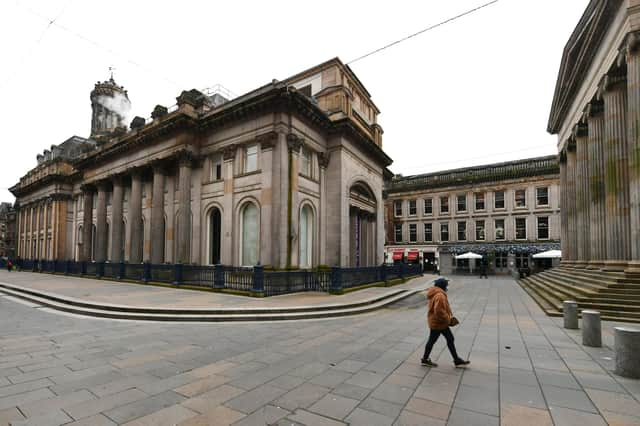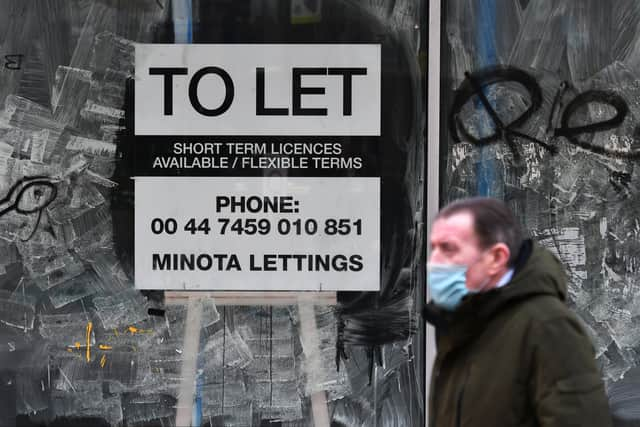Covid economic crisis and Brexit uncertainty provide just a taste of what Scottish independence would bring – John McLellan


Weeks away from permanent closure, its total revenue in the past three weeks was less than £500, yet its monthly rent alone is over £3,000.
“The Scottish government continues to treat the trade with contempt,” he wrote, and without evening opening or the mark-up on wine, there is only one way that business is going under Tier 3. With it will go the jobs of staff who will join the 2.6 million people Chancellor Rishi Sunak warned could be unemployed by the middle of next year.
Advertisement
Hide AdAdvertisement
Hide Ad“We ask the Scottish government to urgently reconsider their heavy-handed approach to restrictions, or to provide a fair financial support package which will allow businesses to survive,” he added. “We are grateful for the support there is, but it is not enough. With these restrictions, it is all but inevitable that city centres will be permanently hollowed, with livelihoods crushed and many more people left unemployed.”
Venezuela beckons?
This is the reality facing the hospitality sector, and in Edinburgh alone the 33,000 people it employs account for nearly a tenth of the city’s pre-Covid workforce, many of whom will already have been furloughed and reliant on the UK government scheme to pay their bills. Over 900,000 Scottish workers have been supported through the job retention system, in posts which would otherwise disappear without it meeting 80 per cent of their wages and unless there is either a dramatic and unforeseen bounce in the economy or continued subsidy, those people will join the 1.6 million already out of work.
A diminishing number of people in the private sector means diminishing tax revenue and soaring welfare costs, and without drastic action that means more public debt on top of the £394 billion the UK government is expected to have borrowed this year – the highest in peacetime according to the Chancellor – if public spending and taxation is to be maintained at current levels. Without spending controls, the only alternative is eye-watering tax increases – primarily income tax and VAT – which will hit public sector workers harder than a pay freeze; a slap in the face or a kick in the privates, as it were.


Either by opposing tax rises or spending control, there is a growing belief that the government can carry on printing money indefinitely, but the reality is the Bank of England only generates cash because the strength of public finances rebuilt since the bank crash gives it the confidence to fund government bonds. The Office for Budget Responsibility estimates the UK economy in 2025 will have shrunk by three per cent, over £60bn, and the Bank of England won’t keep the Royal Mint busy if the economy doesn’t recover. The brutal truth is if the government can’t pay the bearer on demand, the cost of borrowing will rise and Venezuela beckons if spending isn’t brought under control.
Re-open economy in 2021
It’s against the background of soaring private sector unemployment and spiralling government debt that the angry public sector reaction to frozen pay has to be set. Firstly, according to the Office for National Statistics, public sector workers’ pay is seven per cent higher for an equivalent private-sector job. And while those workers affected – not the lowest paid or front-line health workers – might be angered by a real-terms pay cut after inflation, they are not facing redundancy to the same extent or having to use hard-earned savings to keep their businesses going.
There is even the bizarre situation in some councils like Edinburgh which has taken government money to furlough staff, a scheme specifically for jobs at risk, with no likelihood of laying them off because of a ban on compulsory redundancy.
The only course of action is the re-opening of the economy as early as possible in 2021, with the NHS fully geared up to cope and the vaccine programme demonstrably accelerated. Daily death rates from cancer and heart disease should be published along with Covid data to provide badly needed context.
Pay freezes for public workers, the dole for private ones, and tax rises for everyone else; in the midst of an economic emergency graphically spelt out by the Chancellor, no wonder a majority of people across the political spectrum support reducing the international aid target from 0.7 per cent of gross national income to 0.5, still the second biggest proportion of the G7 nations.
SNP set to ramp up rhetoric
Advertisement
Hide AdAdvertisement
Hide AdThe UK will still spend £10bn next year, yet this was shameful according to First Minister Nicola Sturgeon, and even Ruth Davidson was in the vanguard of liberal Conservatives by describing a cut as “morally, economically and politically” counter-productive.
But suspicions about such programmes were confirmed earlier this year by a World Bank report which suggested around a sixth of aid payments in the poorest countries were funnelled into tax havens by a corrupt elite, with Swiss bank accounts noticeably swelling when donations increased. When literally millions of British families are facing the loss of their livelihoods, it would indeed be shameful if their taxes were helping to feather the nests of international kleptocrats.
While UK international aid is reduced by £4bn a year, the Scottish government’s Covid emergency support is expected to fall from £8.2bn this year to £1.3bn in 2021, in line with reductions in England, but it will provide another opportunity for the SNP to ramp up the rhetoric before May’s Scottish elections.
The irony is the financial meltdown now – and continuing Brexit uncertainty – is a taste of what will come should the SNP win an independence referendum next year. Voters will be promised a new beginning, but the reality will be austerity for years to come when, like that restaurant worker, all most people want is certainty to plan their lives and sustainable means to earn a decent living. It’s not Project Fear; we are living it.
A message from the Editor:
Thank you for reading this article. We're more reliant on your support than ever as the shift in consumer habits brought about by coronavirus impacts our advertisers.
If you haven't already, please consider supporting our trusted, fact-checked journalism by taking out a digital subscription.
Comments
Want to join the conversation? Please or to comment on this article.